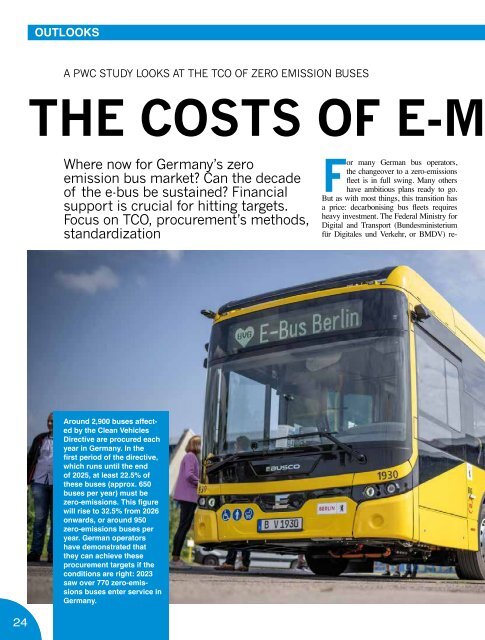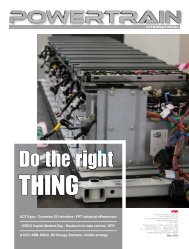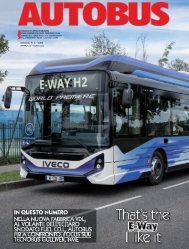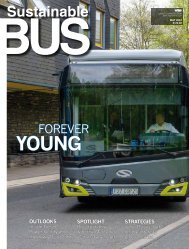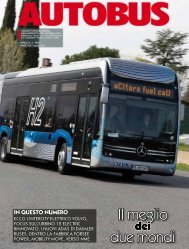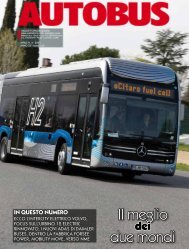2024-02 SUSTAINABLE BUS
In this issue, all the figures on the European e-bus market 2023 (hint: over 40 of the new city buses were electric!), a reporting on #battery manufacturing plans underway in Hungary and their impact on the European #electricbus landscape, a focus on powertrain values and strategies in the realm of e-mobility. Plus, a piece on the challenges faced by #BEV bus adoption in Germany (yes, it's also a matter of TCO).
In this issue, all the figures on the European e-bus market 2023 (hint: over 40 of the new city buses were electric!), a reporting on #battery manufacturing plans underway in Hungary and their impact on the European #electricbus landscape, a focus on powertrain values and strategies in the realm of e-mobility.
Plus, a piece on the challenges faced by #BEV bus adoption in Germany (yes, it's also a matter of TCO).
You also want an ePaper? Increase the reach of your titles
YUMPU automatically turns print PDFs into web optimized ePapers that Google loves.
OUTLOOKS<br />
A PWC STUDY LOOKS AT THE TCO OF ZERO EMISSION <strong>BUS</strong>ES<br />
THE COSTS OF E-MOBILITY<br />
THE AUTHORS<br />
Maximilian Rohs is Director<br />
Infrastructure & Mobility at<br />
PwC Germany<br />
(maximilian.rohs@pwc.com).<br />
Felix Krewerth is Senior<br />
Associate Infrastructure &<br />
Mobility at PwC Germany<br />
(felix.krewerth@pwc.com).<br />
Where now for Germany’s zero<br />
emission bus market? Can the decade<br />
of the e-bus be sustained? Financial<br />
support is crucial for hitting targets.<br />
Focus on TCO, procurement’s methods,<br />
standardization<br />
Around 2,900 buses affected<br />
by the Clean Vehicles<br />
Directive are procured each<br />
year in Germany. In the<br />
first period of the directive,<br />
which runs until the end<br />
of 2<strong>02</strong>5, at least 22.5% of<br />
these buses (approx. 650<br />
buses per year) must be<br />
zero-emissions. This figure<br />
will rise to 32.5% from 2<strong>02</strong>6<br />
onwards, or around 950<br />
zero-emissions buses per<br />
year. German operators<br />
have demonstrated that<br />
they can achieve these<br />
procurement targets if the<br />
conditions are right: 2<strong>02</strong>3<br />
saw over 770 zero-emissions<br />
buses enter service in<br />
Germany.<br />
For many German bus operators,<br />
the changeover to a zero-emissions<br />
fleet is in full swing. Many others<br />
have ambitious plans ready to go.<br />
But as with most things, this transition has<br />
a price: decarbonising bus fleets requires<br />
heavy investment. The Federal Ministry for<br />
Digital and Transport (Bundesministerium<br />
für Digitales und Verkehr, or BMDV) re-<br />
cently extended its comprehensive funding<br />
programme for zero-emissions buses, but<br />
has now had to cancel this programme following<br />
the high-profile ruling by the Federal<br />
Constitutional Court on 15 November 2<strong>02</strong>3<br />
concerning the German Federal Government’s<br />
Climate and Transformation Fund<br />
(Klima- und Transfomationsfonds, or KTF).<br />
The Federal Government had financed the<br />
KTF by transferring €60 billion of borrowing<br />
– authorised during the Covid-19 pandemic<br />
– into a Federal Special Fund for use<br />
over subsequent financial years, an action<br />
which the court declared unconstitutional.<br />
With this source of funding now having<br />
dried up, does this mean that operators in<br />
Germany will have to reconsider their plans<br />
for electric bus fleets?<br />
Federal subsidies’s role<br />
With the BMDV programme now having<br />
been withdrawn, continuing the changeover<br />
to electric buses is set to be a major economic<br />
challenge for the sector. The first three<br />
rounds of funding were massively oversubscribed,<br />
and analysing total cost of ownership<br />
(TCO) data explains why: despite<br />
electric buses being cheaper to operate than<br />
traditional types, these savings do not fully<br />
offset their much higher procurement costs –<br />
particularly in the case of battery buses.<br />
Based on PwC’s cost model, our TCO analysis<br />
factors in all costs that are directly associated<br />
with a bus and putting it into service,<br />
using an example which compares the<br />
capital costs (CAPEX) and operating costs<br />
(OPEX) of non-articulated diesel and battery-electric<br />
buses. All expected costs were<br />
aggregated and then divided by the bus’s<br />
service life (12 years) at the point of entry<br />
into service (<strong>2<strong>02</strong>4</strong>). The operating cost analysis<br />
included dynamic diesel and electricity<br />
prices – for example, it factored in the increases<br />
in carbon taxation which are expected<br />
to occur in Germany. The values shown<br />
in the diagram below are averages over the<br />
bus’s service life.<br />
Comparing the TCO clearly shows where the<br />
additional costs lie for battery buses: namely,<br />
in the capital costs of the buses and the<br />
necessary infrastructure. Based on current<br />
information, including more than 1,000 price<br />
points for battery buses, the average procurement<br />
price of a non-articulated battery-electric<br />
bus is around €600,000. This has to be<br />
financed by the operator, and is around 2.5<br />
times more than for a diesel bus of the same<br />
size, which has a price tag of only around<br />
€260,000. The now-withdrawn funding pro-<br />
grammes for electric buses provided subsidies<br />
for 80% of the additional capital costs,<br />
thus reducing the costs to be borne by the bus<br />
operator to around €330,000. Under the assumptions<br />
used for our analysis, this would<br />
bring the TCO of battery buses down very<br />
close to that of diesel buses.<br />
One-to-one replacement is possible<br />
Provided that vehicle schedules are suitably<br />
modified, practical experience has also<br />
shown that a gradual changeover to battery-electric<br />
buses (as generally practised in<br />
Germany) can usually be achieved without<br />
needing to procure a large number of additional<br />
vehicles to compensate for their shorter<br />
range. As the technology currently stands,<br />
however, a rapid changeover may require a<br />
certain number of extra buses (and therefore,<br />
COST PER KM<br />
1,80€<br />
1,60€<br />
1,40€<br />
1,20€<br />
1,00€<br />
0,80€<br />
0,60€<br />
0,40€<br />
0,20€<br />
0€<br />
0,32 €<br />
0,77 €<br />
0,36 €<br />
solo diesel<br />
vehicle capex<br />
charging infra capex<br />
workshop infrastructure capex<br />
energy opex<br />
maintenance vehicle/infra opex<br />
battery replacement opex<br />
0,<strong>02</strong> €<br />
0,14 €<br />
0,31 €<br />
0,41 €<br />
0,07 €<br />
0,82 €<br />
solo BEV<br />
Total Costs of Ownership by drivetrain<br />
in €/km (12 m bus, base year <strong>2<strong>02</strong>4</strong>, 60.000<br />
vehicle-km p.a., 12 year utilization)<br />
Source: PwC<br />
24<br />
25


